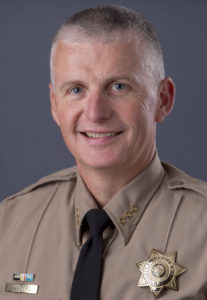
Oregon State Police started getting the calls about 1:20 p.m. on a mid-April Thursday. There was a man sitting on the shoulder of Oregon 229 along the Siltez River near Kernville and acting erractically.
Twenty minutes later there were more reports of a shirtless man jumping out into traffic.
When they arrived, state troopers reported the man was uncooperative, threatening violence and appeared to be hallucinating.
But rather than use force to take the man into custody themselves, troopers called a new Lincoln County mental health crisis team consisting of a sheriff’s deputy and counselor.
By 3 p.m. the man was headed to the hospital in Lincoln City for evaluation.
And that’s how the new Lincoln County community outreach and mental health enhancement team – called COMET – is designed to work.
The new team paired a Lincoln County mental health counselor with a sheriff’s deputy and has been operating since March in an attempt to find a different way for police to respond to a growing number of mental health calls. The goal is to connect people with resources before they land in jail.
The team consists of a counselor and a support staffer from the Lincoln Community Health Center, which received a $167,000 federal grant, and a deputy from the sheriff’s office. They respond to calls, make referrals and connect vulnerable people with services.
The mental health counselor is Liz Scott and the sheriff’s deputy is Siscilee Gouge. Ellen Wenzel in the county’s health department provides follow-up support.
“It could be that someone calls law enforcement because of a person yelling and talking to themselves in a public place,” said Sheryl Fisher, the county’s director of behavioral health. “Maybe a person is off medications and not functioning well enough to call for help. This team can reach out to people, help them feel safe, and connect them with primary care services and other assistance.”
There is increasing demand for the service, said sheriff’s Lt. Adam Shanks.
“In my early days, the calls for service were mostly tagged as a suspicious person or a suspicious activity,” Shanks said. “Most calls now are related to an emotionally-disturbed person and those calls have increased dramatically … ” and often tied to drug use and mental health disorders.
As a patrol deputy, Gouge said she carried items in her car to share with people in need.
“Often we see red flags thrown up, but as a patrol deputy you don’t have enough time to put into issues that may not even be a crime,” she said.
That changes with the formation of COMET.
“Helping them should be much more seamless and we should get to people before it becomes a situation where they hurt somebody or themselves,” Gouge noted.

The program had to adjust a bit after the sheriff’s office made changes to its patrols and call responses because of the coronavirus pandemic and resulting restrictions.
“If it is a serious issue, or life threatening and something they can not handle through telephone or other means, they will respond in person,” said Sheriff Curtis Landers.
Gouge and Scott also review calls to the sheriff’s office “to determine if a response is needed or if other follow up methods can be made,” Landers said.
Scott, who is also a certified drug and alcohol counselor, saw how a similar program worked well in Benton County.
“I noticed that it made a huge difference in how quickly people could access services in a crisis,” she said. “Once we started coordinating with law enforcement (in Benton County), it just seemed to create a lot more efficient collaboration.”
Because one of the goals is to put people at ease, Gouge and Scott will drive an unmarked sheriff’s vehicle.

Since starting, the two have made hundreds of contacts with individuals and organizations, often acting as a liaison between governmental, non-profit, and community organizations to streamline services and help prevent the duplication of effort.
“Organizations sometimes don’t realize who is doing what for a person. In some cases, several places are all doing the same thing and trying to get a client set up with the same services,” said Gouge. “In other cases, two organizations are thinking a client is receiving help from the other and not connecting them with what they need. What we’ve found is that everybody is out there to help. They just need assistance getting on the same page sometimes, because we interact with a population who occasionally has trouble communicating that.”
The sheriff’s office said COMET has found housing for several people — one of them homeless for eight years — in either permanent or transitional capacities. They have several clients they check in with on a regular basis, especially those who are frequent users of services. In one case, a person went from averaging 10 law enforcement contacts per week to only having regular “check-ins” with COMET.
“I am extremely pleased with the progress COMET has made so quickly,” Landers said. “We knew it was the right thing to do and would help individuals, but I didn’t realize it would achieve such rapid success.”


